(!)Due to Microsoft's end of support for Internet Explorer 11 on 15/06/2022, this site does not support the recommended environment.
Instead, please kindly use other browsers like Google Chrome, Microsoft Edge or Mozilla Firefox.
50,000 Stock items for Same Day Ship Out.
All Categories
Categories
- Automation Components
A wide variety of standard and configurable components for factory automation engineers in industries such as automotive, semiconductor, packaging, medical and many more.
- Linear Motion
- Rotary Motion
- Connecting Parts
- Rotary Power Transmission
- Motors
- Conveyors & Material Handling
- Locating, Positioning, Jigs & Fixtures
- Inspection
- Sensors, Switches
- Pneumatics, Hydraulics
- Vacuum Components
- Hydraulic Equipment
- Discharging / Painting Devices
- Pipe, Tubes, Hoses & Fittings
- Modules, Units
- Heaters, Temperature Control
- Framing & Support
- Casters, Leveling Mounts, Posts
- Doors, Cabinet Hardware
- Springs, Shock Absorbers
- Adjusting, Fastening, Magnets
- Antivibration, Soundproofing Materials, Safety Products
- Fasteners
A good selection of accessories such as screws, bolts, washers and nuts that you may need for your daily engineering usage.
- Materials
Browse industrial materials ranging from heat insulating plates, sponges, to metal and plastic materials in different sizes to meet your various applications.
- Wiring Components
A wide variety of wiring parts for connecting and protecting control and PC parts including Connectors, Cables, Electric Wires, Crimping Terminals and more.
- LAN Cables / Industrial Network Cables
- Cables by Application
- Cables with Connectors
- RS232 / Personal Computers / AV Cables
- Wires/Cables
- Connectors (General Purpose)
- Crimp Terminals
- Zip Ties
- Cable Glands
- Cable Bushings/Clips/Stickers
- Screws/Spacers
- Cable Accessories
- Tubes
- Protection Tubes
- Ducts/Wiremolds
- General Purpose Tools
- Dedicated Tools
- Soldering Supplies
- Electrical & Controls
A wide variety of controls and PC parts for electrical engineers including Controls, Powers, PC parts and more.
- Cutting Tools
A wide variety of cutting tools for many uses and work materials including End Mills, Drills, Cutters, Reamers, Turning Tools and more.
- Carbide End Mills
- HSS End Mills
- Milling Cutter Inserts/Holders
- Customized Straight Blade End Mills
- Dedicated Cutters
- Turning Tools
- Drill Bits
- Screw-Hole-Related Tools
- Reamers
- Chamfering / Centering Tools
- Fixtures Related to Cutting Tools
- Step Drills
- Hole Saws
- Clean Key Cutters
- Core Drills (Tip Tools)
- Magnetic Drilling Machine Cutters
- Drill Bits for Electric Drilling Machines
- Woodworking Drill Cutters
- Drills for Concrete
- Processing Tools
A wide variety of tools and supplies used in processing including Machine Tools, Measurement Tools, Grinding and Polishing Supplies and more.
- Material Handling & Storage
A wide variety of goods used in shipment, material handling and warehouse including Tape supplies, Stretch film, Truck, Shelf, Crane and more.
- Tape Supplies
- Cushioning Materials
- Stretch Films
- Cardboard
- Plastic Bags
- PP Bands
- Magic Tapes / Tying Belts
- Rubber Bands
- Strings/Ropes
- Cable Ties
- Tags
- Labelers
- Unpacking Cutters
- Packing Support Equipment
- Cloth Sheets for Packing
- Conveyance/Dolly Carts
- Tool Wagons
- Tool Cabinets / Container Racks
- Lifters / Hand Pallets
- Container Pallets
- Storage Supplies
- Shelves/Racks
- Work Benches
- Suspended Clamps/Suspended Belts
- Jack Winches
- Chain Block Cranes
- Bottles/Containers
- Bicycle Storage Area
- Safety & General Supplies
A large variety of goods for every kind of factories and offices including Protection items, Cleaning supplies, sanitations, office supplies and more.
- Lab & Clean Room Supplies
A large variety of items used in R&D and Clean Room including research Equipment, Laboratory Essentials, Analysis Supplies, Clean Environment-Related Equipment and more.
- Press Die Components
Choose from thousands of standard stamping die components including Punch & Die, Gas Springs, Guide Components, Coil Springs and many more.
- Plastic Mold Components
Browse our wide variety of mold components including Ejector Pins, Sleeves, Leader Components, Sprue Bushings and many more.
- Ejector Pins
- Sleeves, Center Pins
- Core Pins
- Sprue bushings, Gates, and other components
- Date Mark Inserts, Recycle Mark Inserts, Pins with Gas Vent
- Undercut, Plates
- Leader Components, Components for Ejector Space
- Mold Opening Controllers
- Cooling or Heating Components
- Accessories, Others
- Components of Large Mold, Die Casting
- Injection Molding Components
Browse our injection molding components including Heating Items, Couplers, Hoses and more.
- Injection Molding Machine Products
- Accessories of Equipment
- Auxiliary Equipment
- Air Nippers
- Air Cylinders
- Air Chuck for Runner
- Chuck Board Components
- Frames
- Suction Components
- Parallel Air Chuck
- Special Air Chuck
- Chemical for Injection Molding
- Mold Maintenance
- Heating Items
- Heat Insulation Sheets
- Couplers, Plugs, One-touch Joints
- Tubes, Hoses, Peripheral Components
Search by Application
Brands
- Please be informed that our office is closed during the upcoming Labour Day Holiday in 2024. We would also like to inform you that there may be a potential delay in response/shipment from the supplier due to the Japan Golden Week holiday which falls from 29th April to 6th May 2024. Click here for details.
- Please Note our New Address (effective April 1, 2024): 331 North Bridge Rd, #05-01 Odeon 331, Singapore 188720.
Temperature Sensors Standard Screw Mount K-Thermocouple
- Volume Discount
Temperature Sensors Standard Screw Mount K-Thermocouple
These Temperature Sensors Thermocouple type K are an economy item, The price is cheaper than the MISUMI standard product.They offer a wide variety of sizes to choose from.
[Feature]
● Temperature Sensors : Thermocouple Type K
● Screw Size: M6 X 1.0
● Wire Length (m.): 1, 2, and 5
● Temperature Range (°C) : 0-300
● Crimp Terminal Type: Y-Shaped 2 sets
[Application]
It is used in a variety of application such as heat treatment, packaging industry , plastic industry , and so on.
Part Number
Configured Part Number is shown.
Temperature Sensors Dimensional Drawing

For more information on product dimensional drawings, please refer to the Temperature Sensors product catalog.
Temperature Sensors Specification Table
| Temperature Sensors Type | F(m) | Screw Size | L(mm) | Shape | Temperature Range |
| C-MSNDML6 | 1 | M6×1.0 | 65 | K type thermocouples | 0 to 300℃ |
| 2 | |||||
| 5 |
Temperature Sensors Product Overview
The thermocouple consists of two wires made of different materials, which are welded together at the end. After the ambient temperature of the unheated part is measured, the temperature of the heating point can be accurately known. Because it must have the conductor made of two different materials, it is called the thermocouple. The thermocouples made of different materials can be used in different temperature ranges, and their sensitivities are different from each other. The sensitivity of a thermocouple refers to the change in the output potential difference when the temperature of the heating point changes by 1°C. For most metal-supported thermocouples, this value is between 5-40 µV/°C.
PT100
Pt100 is a platinum thermal resistance, and its resistance value is proportional to the change of temperature. 100 after PT means that its resistance value is 100 ohms at 0°C and about 138.5 ohms at 100°C.
Temperature Sensors Product Feature
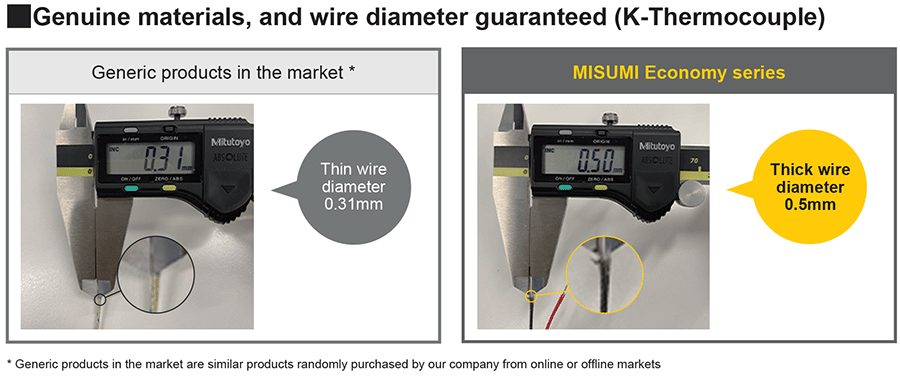
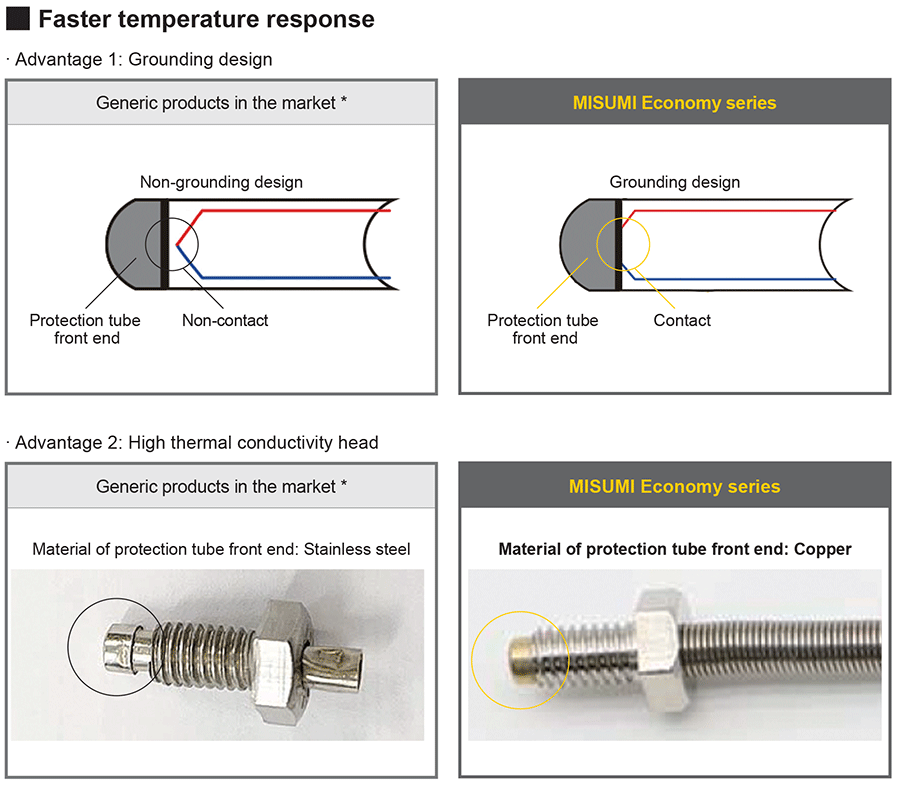
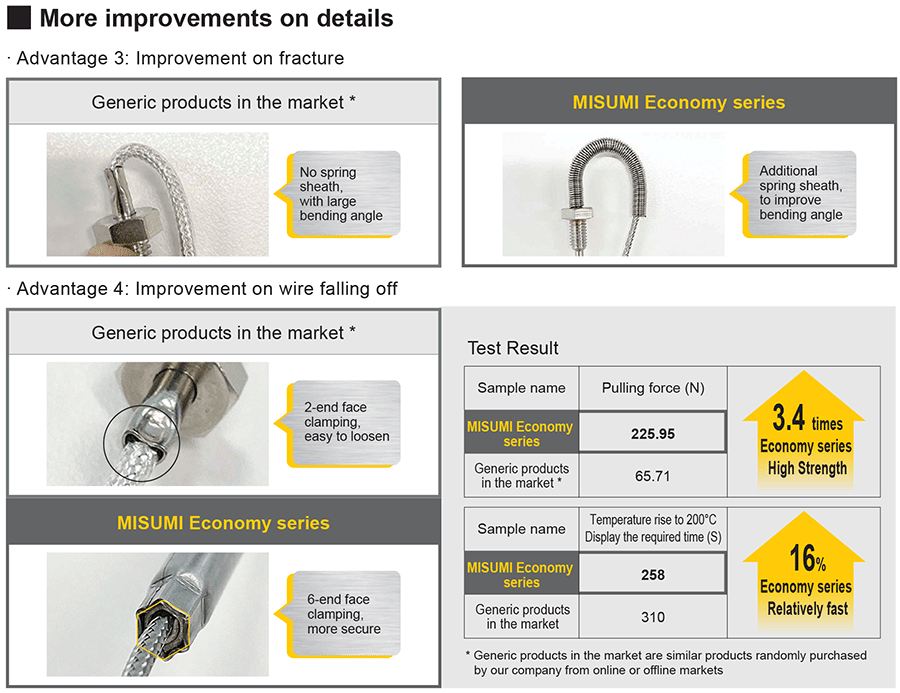

Temperature Sensors Related Products
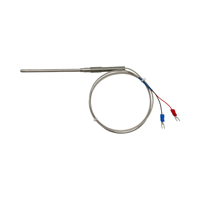 | 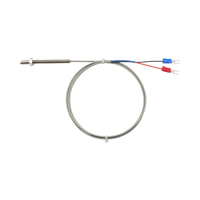 | 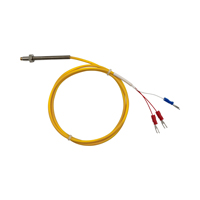 | 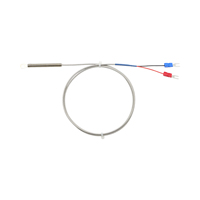 |
| Temperature Sensors High-temperature thermocouples | Temperature Sensors Screw-mounting thermocouples | Temperature Sensors Screw mount bendable PT100 | Round terminal thermocouples |
Temperature Sensors Precautions
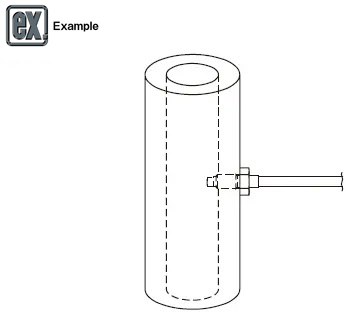
 Temperature Sensors Precautions for use
Temperature Sensors Precautions for use The sheath type can be bent (minimum bending radius: sheath diameter × 5), but the part in the temperature detection range (20 mm of the front end) cannot be bent. The protective tube type cannot be bent, otherwise the temperature cannot be measured correctly.
The sheath type can be bent (minimum bending radius: sheath diameter × 5), but the part in the temperature detection range (20 mm of the front end) cannot be bent. The protective tube type cannot be bent, otherwise the temperature cannot be measured correctly. To extend the thermocouple lead wire, please use the compensation lead wire.
To extend the thermocouple lead wire, please use the compensation lead wire. Please strictly observe the heat resistant temperature of each part in product page. Please note that even the upper limit of the temperature measurement is very high, malfunctions such as wire breakage may occur if the heat-resistant Temperature Sensors is exceeded.
Please strictly observe the heat resistant temperature of each part in product page. Please note that even the upper limit of the temperature measurement is very high, malfunctions such as wire breakage may occur if the heat-resistant Temperature Sensors is exceeded. Do not apply large external force or vibration.
Do not apply large external force or vibration. Please note the heat resistance temperature of the sleeve part.
Please note the heat resistance temperature of the sleeve part. Please keep the upper limit of the temperature below the temperature measurement range of the product. If the bushing temperature exceeds the heat-resistant temperature, it is very easy to cause the breakage of the temperature measurement wire.
Please keep the upper limit of the temperature below the temperature measurement range of the product. If the bushing temperature exceeds the heat-resistant temperature, it is very easy to cause the breakage of the temperature measurement wire. If the temperature of heat generating parts exceeds 100°C, please choose the specification with a front end as long as possible.
If the temperature of heat generating parts exceeds 100°C, please choose the specification with a front end as long as possible.Temperature Sensors Usage Method
Temperature Sensors Brand introduction
Part Number
CAD Data download and 3D preview are not available because the part number has not yet been determined.
- *In order to open the CAD Data download and 3D preview screen, the part number must be fixed.
- Please confirm the part number from "Specification / Dimension"on the left side, and then perform the CAD Data Download / 3D Preview operation.
| Part Number |
|---|
| C-MSNDML6-1 |
| C-MSNDML6-2 |
| C-MSNDML6-5 |
| Part Number | Standard Unit Price | Minimum order quantity | Volume Discount | Days to Ship | Lead Wire Length (F) (m) |
|---|---|---|---|---|---|
SGD 9.92 | 2 Piece(s) | Available | 5 Day(s) | 1 | |
SGD 11.85 | 1 Piece(s) | Available | Same day | 2 | |
SGD 17.66 | 1 Piece(s) | Available | 5 Day(s) | 5 |
Loading...

For more information on product dimensional drawings, please refer to the product catalog.
| Type | F(m) | Screw Size | L(mm) | Shape | Temperature Range |
| C-MSNDML6 | 1 | M6×1.0 | 65 | K type thermocouples | 0 to 300℃ |
| 2 | |||||
| 5 |
Basic Information
| Type of Temperature Sensor | Thermocouple | Type of Thermocouple | K Thermocouple | Sheath, Protection Tube Diameter(Ø) | 3 |
|---|---|---|---|---|---|
| Sheath, Protecting Tube Length L(mm) | 65 | Measurement Object | Temperature Sensor | Temperature Measurement Contact Point | Grounded Type |
| Operating Temperature Range(°C) | 0::300 |
- The specifications and dimensions of some parts may not be fully covered. For exact details, refer to manufacturer catalogs .
Frequently asked question (FAQ)
- Question: What are the main types of sensors currently sold by MISUMI?
- Answer: Photoelectric sensors, proximity sensors, pressure sensors, temperature sensors, etc.
- Question: What is a photo microsensors?
- Answer: With an amplifier, an emitter and a receiver built in its integrated main body, it is a sensor that is easy to install and adjust, usually designed for detecting the passage of workpieces on the conveying line and for positioning workpieces, etc.
- Question: What are the features of the photoelectric sensor?
-
Answer:
1. The action (response time) is very fast because light is used as the medium.
2. It has a longer detection distance than the light sensor and allows for remote detection.
3. Objects made of almost any material can be detected as long as they reflect light. - Question: What are the detection methods of the photoelectric sensor?
- Answer: Transmittance type, regression reflection type, diffusion reflection type, limited reflection type, etc.



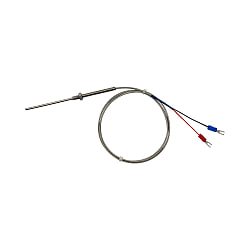



How can we improve?
How can we improve?